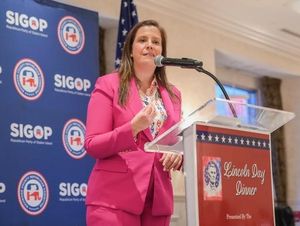With less than four weeks remaining before the pivotal 2025 Bundestag elections, Germany's political climate has taken a dramatic turn, as recent polls indicate significant shifts in voter sentiment. According to the latest YouGov survey, support for Chancellor Olaf Scholz's Social Democratic Party (SPD) has fallen markedly to 15%, down four percentage points from previous weeks. Meanwhile, the right-wing Alternative for Germany (AfD) has seen its support rise to 23%, positioning itself as the second-largest party behind the Christian Democratic Union (CDU), which has increased its standing to 29%.
These changes are occurring against the backdrop of heightened concerns over migration, especially following the shocking knife attack in Ashaffenburg on January 22, which resulted in two fatalities. This incident has catalyzed discussions around immigration policies, leading the public to prioritize these issues more than ever. Just last week, only 23% of respondents considered migration their top concern; this figure has surged to 36% following the attack.
Friedrich Merz, the CDU leader, has responded to the rising tide of concerns by proposing tighter immigration regulations, aiming to leverage this pivotal moment as the election nears. His proposals have drawn both criticism and cautious support from various factions. For example, FDP leader Christian Lindner has reiterated the need for stricter controls. He noted, “The Union’s motion reflects our position, though he warned the public against potential overreach, stating, 'We cannot afford to lose our principles.'”
On the opposing side, Katharina Dröge, leader of the Greens, has cautioned against entering alliances with the AfD, warning, “If we see the CDU aligning with the AfD on controversial votes, this marks a historic shift for the Bundestag.” This sentiment reflects the unease among traditional parties about the mainstreaming of far-right rhetoric.
Adding more fuel to the fire, Scholz has labeled Elon Musk's support for the AfD as "genuinely disgraceful," highlighting the challenge faced by center-left politics as ultra-wealthy individuals exert influence over the political narrative.
Analyzing the polling data, it is clear the SPD is under increased pressure to recover lost ground. Once buoyed by promises of stability and progressive governance, the party now faces questions about its effectiveness and ability to connect with voters’ pressing concerns. The loss of support can be attributed to fragmentation within the coalition, made evident as each party struggles to maintain its voter base amid rising populist sentiments.
The recent data also shows the Greens slipping to 13%, losing two percentage points, showing the challenge faced by both governing parties at this pivotal juncture. The Free Democratic Party (FDP) too has dropped to 3%, reflecting the overall dissatisfaction among voters.
Should these trends persist, the political ramifications for the SPD and its partners could be significant, compelling them to reevaluate their strategies well before the election date. Interestingly, other parties, including the left-wing figures like Sahra Wagenknecht, have maintained stable support at 6%, showing resilience amid the turbulence booming from rising extremism.
Expert analysis suggests the AfD's ascent is less about its policies and more about how traditional parties react to them. Forsa’s Peter Matuschek indicated, “The AfD gains traction not merely from its own actions but significantly from the responses of mainstream parties.” This offers insightful reflection on the current political strategy, where the CDU must tread carefully as it navigates public sentiment.
Looking at how these dynamics play out leading to the elections, it is clear the migration debate will not only shape voter allegiance but could potentially redefine political alliances within the Bundestag itself. Analysts warn of the dangers inherent if CDU and AfD discussions lead to cooperation—a situation which could alienate moderate voters.
Voting patterns will be closely monitored as election day approaches; each poll release could potentially shift allegiance one way or the other, and the traditional party lines are significantly blurred. For now, wariness and posturing dominate the discourse as Germany heads toward one of its most contentious elections of recent times. Whatever the outcome, the 2025 elections will undoubtedly have lasting consequences for the country and beyond.



